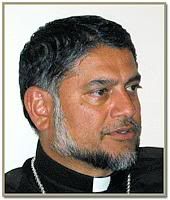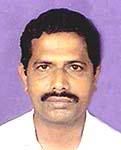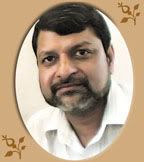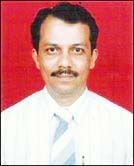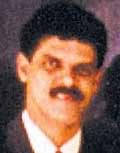Dear Sisters and Brothers,
At the onset of another Pastoral Year, a gift from God, I greet you with great love and deep affection in the name of Jesus, Our Lord!
Introduction
According to the marvellous design of the Father and impelled by the Holy Spirit, Jesus Christ, the Son of the living God, by his life, suffering, death and resurrection, made us, sinners, heirs of the heavenly Kingdom, and enabled us to become, though our baptism, part of God’s family, the Church. In her earthly pilgrimage, the Church strives to be "the universal sacrament of salvation" (LG 48; AG 1) and Jesus, her Founder, continues to guide her with the never-failing cooperation of the Holy Spirit. According to his design, the Church was given a renewed awareness of her mission through the Vatican Council II, a few decades ago.
It is good to note that
Ad Gentes - this important Council document which deals with Christian witness and Evangelization - is completing forty years this year. We also celebrate, this year, the 500th birth anniversary of our great and beloved St. Francis Xavier. May these two jubilees serve as an occasion for the Church in Goa to reflect deeply on her mission of witnessing and presenting Christ to the world as well as to make a critical review of the road already travelled.
With this in mind, for this new Pastoral Year, we have chosen as a theme for our reflection,
Christian Witness in the Society: Challenge of the Eucharist. We will certainly remember that, under the inspiration of Pope John Paul II, of revered memory, we had taken up, for the last Pastoral Year, the theme,
Families, Enlightened and Strengthened by the Eucharist, Sent to Build a New Society; and, in the previous year, we had reflected on
Eucharist and Our Life.
In the last many years, the Church in Goa has been taking various steps towards her renewal. One of the most important steps was the Goa Diocesan Synod 2002. This Synod has challenged us to become the leaven of our society as we go about our mission of witnessing to Christ (cf. SDS 37). The challenge of the Eucharist is the same: the followers of Christ cannot confine the practice of their faith to the walls of their church building; their witness must rather shine out in society. This is also my burning desire. And it is with this hope that I present this Pastoral Letter to you, so that, with the strength and the grace of the Holy Eucharist, we may witness and proclaim Christ with great earnest in our society.
Eucharist and Christian Witness in Society
At the end of the celebration of the Eucharist, the priest sends the people with these words: The Mass is ended, go in the peace of Christ. From there, the world becomes the altar of life where the Eucharist is lived on; the Eucharist thus challenges us to live in the midst of daily life what we have celebrated at the altar and, at the same time, gives us the strength to meet the challenge.
Jesus came to give humankind integral salvation. He brought us true freedom by his cross, death and resurrection (cf. Heb 5:8-10; Rom 6:4; Col 3:1; Eph 1:17). Just as the Father sent him to the world, Jesus sends us forth, in the Eucharist, to be his witnesses (cf. Jn 20:21). "If the Eucharistic Memorial fails to sharpen and deepen our social sensitivity and commitment, it tends to become a mockery of the Lord, who struggled ... for the poor and the voiceless" (SDS 167; cf. DCE 14). Some of the moments of the Mass indicated below encourage us to get more involved in the life of the community:
a. The Word of God: We need to have a new vision if we are to overcome personal and social evil. The Word of God illumines our hearts and minds and impels us to give witness to Christian values and principles. With the 'fire' and the inspiration of the Word of God, our hearts and minds must be ablaze with social concern, thus making Christ present in our society. Therefore it is important that, in our personal, family and community life, we read, study and internalize the Word of God.
b. Offering of Life: By reading and meditating on the Word of God, we will become more and more, like Jesus, dedicated to God and to the people. The sacrifice, in which Jesus offered Himself on the cross, is bequeathed to us in the Eucharist under the signs of bread and wine. With Jesus, we too offer ourselves to the Father under the signs of bread and wine. The one who participates in the Holy Eucharist is willing to break his or her life, as Jesus did, for the greater good of the society. Thus the commandment given to us at the Last Supper, "you too do likewise" (Jn 13:15), comes alive in each one of us.
c. Do Good, Shun Evil: If we are to live up to the offering of ourselves to God and to our neighbour, we must continuously battle with evil and keep doing good, just as Jesus went about doing good (cf. Acts 10:38). At the beginning of the Eucharistic Celebration we confess that 'I have sinned ... in what I have done and in what I have failed to do.' To do good and to avoid evil ought to be the goal of our life. Truly, every human being finds this desire deeply ingrained in his conscience. Would that more and more people cherished it!
1 - Christian Faithful in Society
Jesus dedicated all his life, that is, his teaching and his work, to the integral salvation of humankind. He began his public ministry by invoking the words of the Book of Isaiah (cf. Lk 4:14-18). In the Sermon on the Mount he revealed to us the perspective of his Mission (cf. Mt 5: 3-11). He showed genuine concern towards the poor, the powerless, the marginalized and towards those who are denied their rights.
Jesus invites us, his disciples of today, to continue this important work. He sends us forth to become the 'salt of the earth' and the 'light of the world' (Mt 5:13-16). In this manner we will be known as true followers of Jesus (cf. SDS 172). Each Christian, through Baptism, shares in the triple mission of Jesus and, in the Holy Eucharist, receives the inspiration and the strength to dedicate his or her life for the service to others (cf. DCE 18). As we look around us, we are exposed to different types of people and of situations. In Goa, quite a large number of Christians are committed to witnessing to their faith in their social milieu. They remain true to Christian values and principles and strive to live their faith amidst various social conditions. We rejoice in this!
Compared to the other States in India, Goa is not only an oasis of relative peace, but it also stands out in its economic development. Goans have made a name for themselves throughout the world. Literacy rate in Goa is high, the business of tourism has helped many to improve their economic condition, the State Government renders monthly assistance to the old and the disabled, helps students to acquire technological equipment in their education and provides the indigent with health treatment facilities, etc.
Of course, the above picture should not give the impression that everything is well.
Unfortunately, a number of our young people leave Goa, due to lack of suitable employment. The winds of globalization have been blowing in Goa too, and the impact is clearly felt. It appears that sound values are given less importance in our governance; corruption in our public administration goes unabated; very little seems to move without bribing. Some experiments with western culture seem to threaten what is best in Goan culture. The business of tourism has contributed towards the devaluation of the human person and Goa is being unscrupulously sold in the name of economic development.
Religious, cultural and human principles – respect for the elders, concern for family and neighbour, etc – are slowly eroding. Our educational institutions fail to challenge our students and to fire them with enthusiasm for doing research and for pursuing excellence.
In this context, our prophetic voice must be heard loud and clear. We could take up the following areas as we go about this mission, facing the various challenges that come our way:
1.1. Education: We ought to develop a critical mind in analyzing the various situations and take up courage to break unjust social structures and to fight against evil. Let us also see that appropriate orientation is given to students in our educational institutions, so that awareness is created for one’s responsibility to engage in public good.
1.2. Work: It is very important to recognize the dignity of labour. Work is holy, because those who engage in work are holy. It is the responsibility of every one to help create working conditions that promote genuine human progress.
1.3. Business: The ultimate goal of any development is the human person (cf. EA 33). The development of business as a result of Globalization cannot exclude the development of the human being (cf. EA 39). Let us maintain, at all costs, moral principles in the world of business.
1.4. Politics: Politics must be the concern and the responsibility of every citizen. All must endeavour to clean up the political establishment for the sake of the greater good of the society. A great challenge before us is to seek upright and truthful leaders, get them elected and, later, to check their performance. For the government that does not follow the law is a government of thieves (St. Augustine).
1.5. Culture: Amidst the cultures of various tourists and travellers mixing with us, it is important that we work to maintain the uniqueness of our own culture. We must, therefore, promote our culture unabashedly.
1.6. Tourism: Let us safeguard Goa’s good reputation by promoting a more humane tourism rather than merely a profit-seeking industry.
In summary, it appears that our society is so entangled in corruption, that it is easy for anyone to sink into the mire and be enslaved by it. I pray therefore that good principles be taught in our families, in our schools and in our catechism classes and also efforts be made to put these principles into practice.
2 - Christian Family in Society
Human life normally begins and ends in a family. Family then is the basic cell of our society. We could generally say that whatever one plans and executes is for the benefit of one's family. Members of healthy families rooted in Christian ideals build good families for the future.
Church documents call the family a "Domestic Church" (LG 11) and "a school of deeper humanity" (FC 21). Within the family, a person learns to be more humane and is thus able to spread compassion in the society. If we maintain good family values -- like spending time together as a family, praying together, respecting each other, being kind to the elderly and the sick, living in truth and in peace – society is renewed and God’s presence shines brighter.
Let us thank God that in our Goa we still value family life. To help maintain discipline, various tasks and responsibilities are allocated to the children in a family. Family members live in mutual concern. We reach out to our neighbors in many ways. We are concerned with the welfare of other families. We continue to give genuine respect to our elders. Despite occasional tensions in the family, we remain in close relationship and affection with one another. Our families work hard to avoid wrong-doing and disunity.
All these good assets in our families should not make us complacent. Every reality has two dimensions. And so, our families have also to face various types of storms:
We live in an increasingly competitive society. Our families are slowly being infected by the virus of outdoing their neighbours; oftentimes this trend is noticed within the family itself, slowly leading to a break-up in the family. Parental love is the right of the child; but the equivalent duty is steadily being neglected today. Immodesty is on the increase in direct proportion to the loss of the sense of sacredness of the human body. To seek sexual pleasure in thought and deed is becoming more and more common. Women and children are treated as being of lesser value. Excessive display of wealth and extravagant expenditures are increasingly becoming a mark of social status. Illegal drugs, prostitution, alcoholism, paedophilia, female foeticide – such scourges are slowly taking root in our families.
If our families are to be schools of human and Christian formation, we need to change our ways a lot. In this context, it is extremely important to strongly protest against anti-family trends often promoted by the media. It is our grave concern and responsibility to raise our prophetic voice in order to promote, through our families, Christian principles in our society. To make this work productive, let us focus on some aspects of our family life:
2.1. Respect for life: Life is holy because it comes from God. "Your bodies are temples of the Holy Spirit" (1 Cor 6:19). Let us promote, in these modern times, a culture of life, by respecting our bodies. Let us keep in mind that contraception and abortion are against God's plan. Let us collaborate to protect all life (of the physically challenged, of the mentally ill, of the elderly, etc.).
2.2. Unity in the Family: Unity in the family is fostered by treating everyone with love, forgiving every one with understanding, making oneself available to the other, respecting one another, etc. This unity is strengthened through prayer. It is important that spouses should work together to abandon any competitive spirit existing between them.
2.3. Respect for Women: The Woman has greater stamina for work. If she is educated, the whole family is educated, and it becomes easier to foster greater equality between the spouses in a family. In this context, spouses can address their problems and differences with greater understanding. Our Christian formation must lead us to promote women’s groups that can provide them with the necessary support when needed.
Only when a family embraces good principles, it can possess true joy and happiness. Such families spread their fragrance in their neighbourhood. In this manner, they keep alive the teaching of Jesus, 'love your neighbour as you love yourself' (Lk 10:27b). Let us go in search of the poor and the needy in our surroundings. By keeping first things first, let us strive to model our families after the Holy Family.
3 - Christian Community in a Larger Society
Through Baptism we have entered in the mystery of Christ's death and resurrection and we have become members of his Mystical Body. If this Mystical Body is to be robust, we, its members, must respond to our Christian calling, that is, the call to holiness, in the various spheres of social life (cf. Eph 1:4; 1 Thess 4:3; LG 39-42; CL 16-17). Our life of holiness must be seen also in our small communities. Christ's early disciples tried to live this call to holiness in their small communities. "They devoted themselves to the apostles' teaching and fellowship, to the breaking of bread and the prayers" (Acts 2:42). In this way, they tried to build loving communities and thus shed the light of Christ's Resurrection among their contemporaries.
In the last twenty centuries, the followers of Christ – the sheep and the shepherds – have been engaged in renewing the face of the earth. In our own Archdiocese, the Church has done yeoman work in the areas of education and health. Many parishes have taken concrete steps to assist the poor and the marginalized. Both shepherds and sheep have not hesitated to speak clearly and forcefully on social issues. The Church, exercising vigilance, has taken the lead to alert people about bad laws being adopted by the government, and also provided leadership to fight against them. On the other side, wherever necessary and appropriate, the Church has enthusiastically collaborated with the State government.
On the other side, if we look around, we see people wreaking environmental destruction, driven by the desire to amass quick wealth; we see the media presenting a distorted notion of sex, the condition of the poor being deteriorated, the sick and the elderly being looked at increasingly as a burden, women's dignity being outraged, children being robbed of their innocence, crime and robberies on the rise, and violence and crime even in the name of religion. In one word: the culture of life is under attack!
To change this undesirable condition and usher in a new society depends, in a large measure, on our lay brothers and sisters. Through the sacraments of Baptism and Confirmation, they share in the priestly, prophetic, kingly/pastoral mission of Christ. And the arena of their work is vast, as it encompasses the worlds of politics, economics, industry, education, the media, the arts and sport (cf. EA 45). By this activity they are to build up a new society. In this way, they fulfill their vocation to promote the Kingdom of God (cf. LG 31).
We probably convinced ourselves that this work of bringing about justice and transformation in society is the responsibility of the government leaders and thus remained aloof. But a closer look will reveal that it also our responsibility. Because social justice is a fundamental aspect of the proclamation of our faith (cf. Justice in the World, Message of the 1971 Synod of Bishops, 7). This is the reason why we all need to work to bring down structures that give rise to injustice and to the trampling of human dignity. By working, then, to renew our society, we live our faith to its fullness.
Let us therefore take committed steps to promote this work, with the strength of the Holy Spirit. Let us all, particularly the laity, take up the challenges presented to us to fulfill our mission in society:
3.1. Christian Faith Commitment: If we, Christ's followers, are to give witness to Christian values and principles, we must first be deeply rooted in our faith. We need, therefore, to gain a genuine personal as well as communitarian experience of Jesus (cf. CL 57; EA 45).
3.2. Full Understanding of Social Situations: In order to establish the Kingdom of God in our society, we must first have a full grasp of the social situations. Only then shall we be able to shed the light of our faith on individual social issues and thus help towards an effective transformation of our society.
3.3. Building a New Society: The goal and the objective of all social development is the human person. Let us raise our prophetic voice to fight against evil and promote whatever upholds human life. Indeed, for the reasons given above, to fight evil plans and structures is the responsibility of every one of us, but in a particular way, of the lay faithful.
In summary, it depends on us, Christ's followers, to make the presence of Jesus felt in our society. With great diligence, then, let us commit ourselves to bring about change in our social milieux. And, with humility, I ask our lay faithful to commit themselves to this task with unbounded zeal.
4. Christian Life and Relationship with Members of Other Faiths
New refreshing winds have been blowing on the life of the Church since Vatican Council II. The Church recognized the need to be respectful of other religions and to be well disposed towards them; she also acknowledged that Christianity was enriched by its contact with other cultural and religious traditions. This new awareness has led to the opening of fresh avenues of dialogue with followers of other faiths.
In this context, the Church has recognized the presence of the seeds of the Gospel in the other religious traditions (cf. LG 16) and acknowledged that the followers of other faiths have been walking on the path of truth in different ways. Pope John Paul II introduced in the Church a good practice to pray together with the leaders of other religions. Our Diocesan Synod has reminded us that we can promote a dialogue of life, of action, of religious experience and of prayer with the sisters and brothers of other religions (cf. SDS 192).
In reality, children in our schools interact freely with children of various other faiths. At the work place, we relate to each other as sisters and brothers, without discrimination of creed. One aspect of Goa's identity is that here people of different religions have always lived in harmony and mutual understanding.
On the other side, however – we must acknowledge – we do not have sufficient knowledge about other religions. And so, owing to some misunderstandings here and there, inter-religious relationships sometimes deteriorate. On such occasions, political parties, in their craving for votes and for political supremacy, often take undue advantage of this our shortcoming and weakness. We have thus made our own lives difficult, by living in doubt and fear of one another. Such negative attitudes have even led to direct confrontations among us.
We must strive to move away from such unhealthy situations and strengthen inter-religious dialogue. May I suggest the following steps for your consideration:
4.1 Deepening mutual understanding: The wealth of each religion lies in its uniqueness. The more we understand the uniqueness of each religion, the more will we be able to respect and understand those who follow other religious traditions. If we were more knowledgeable about other religions, we would be able to defeat the plottings of those with vested interests who use religion to divide and rule.
4.2. Strengthening Dialogue: We should first establish dialogue with those who accept Jesus as their Saviour, but are not members of the Catholic Church. And, with those who do not believe in Christ and even with atheists, we need to strengthen the dialogue of life, of action and of prayer and thus dispel the clouds of mutual suspicion and fear.
4.3. Celebrating Feasts: We need to hold common celebrations of various national holidays and common feasts and have, on these occasions, inter-religious prayer services. All should collaborate in some manner or the other in the preparation and actual celebration of these events.
4.4. Building of Human Communities: As we go about proclaiming the good news of the Kingdom of God, through the example of our life, we face yet another challenge of building small human communities. Let everyone work towards building such communities on the bedrock of peace and justice. All should strive together to protect such communities from communal disharmony and to restore peace wherever needed. Such common action should be eagerly promoted in our village wards.
Let us then work together, regardless of creed or religion and as citizens of the same nation, for the greater good of our society.
Conclusion
Beloved sisters and brothers, the Holy Eucharist constantly poses to us challenges to live our faith in our social milieu. I am writing this Pastoral Letter to you with affection, so that you may be encouraged, with the strength and grace of the Holy Eucharist, to face these challenges daily.
Our Council for Social Justice and Peace organizes a number of programmes to help us give out our Christian witness enthusiastically. This Council is working in earnest to pay due attention to the issues of young women and children, workers, environment and tourism, etc. I would like to express my genuine satisfaction over the work done by this our diocesan body.
The 1971 Synod of Bishops, in its Message, Justice in the World, clearly taught us that to work for justice and to bring about social transformation is an important part of our Christian witness. Consequently, the work of renewing our society is not an appendage to our faith, but is rather fundamental to it. Our Diocesan Synod 2002 had echoed this concern in the following words: "the promotion of social justice is yet to become an integral part of the expression of our faith" (SDS 177).
I warmly congratulate all our sisters and brothers who are engaged in promoting justice in our society! I would like to warn everyone about the attempts being made to malign the good work being done in this field by creating unnecessary conflicts and misunderstandings. It is indeed my desire that the members of the Church may always be in the frontline of the struggle against social injustice.
Let us make a special place in our hearts for those who are marginalized and oppressed. Let us show, in our various pastoral programmes, special concern towards the poor and the distressed. I desire ardently that our Christian faithful, particularly the laity, may contribute to sanctify the various spheres of our society by being involved in them.
In order to further this work of witnessing to Christ in our society, let everyone show concern and interest in establishing a Parish Social Apostolate Forum in each village. In parishes where this Forum is not yet set up, I urge you to take it upon yourselves as a personal responsibility to establish it as soon as possible.
May the Church in our Archdiocese respond, with enthusiasm and seriousness, to the challenges posed by the Holy Eucharist, by being alert to the various situations emerging in our society, registering protests wherever needed, doing away with unjust structures and even initiating public demonstrations. We shall be able, in this way, to live our faith in its fullness and to celebrate the Eucharist with joy and enthusiasm. This is also my great desire and my dream.
To help fulfill this dream I pray to our Blessed Mother, that she may accompany us on our pilgrimage of faith. St. Francis Xavier, the Patron of the Missions and Blessed Joseph Vaz, the Patron of our Archdiocese, have cherished in their hearts a special concern for the needy, the suffering, the abandoned and those of other faiths. Inspired by their life-example, may we too be courageous witnesses of the Church’s concern in the society today.
May the abundant blessings of the Holy Eucharist descend upon you all.
Archbishop’s House, Panjim, Goa, May 25, 2006.
Sd/-
(+ Filipe Neri Ferrão)
Archbishop of Goa and Daman
DOCUMENTS REFERRED TO:
A.G. Ad Gentes
C.L. Christifideles Laici
D.C.E. Deus Caritas Est
E.A. Ecclesia in Asia
F.C. Familiaris Consortio
L.G. Lumen Gentium
S.D.S. Statement of the Diocesan Synod 2002
The original version of this Pastoral Letter No. CP-Past/147/2006 written in the Konkani language can be read in the Konkani Catholics egroup.
